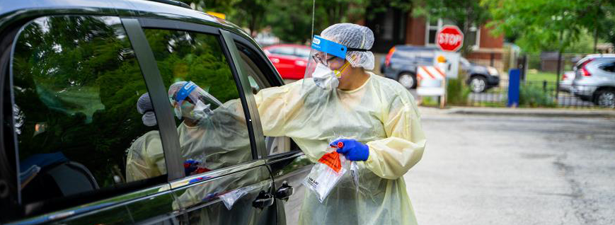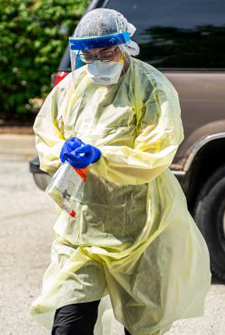Humboldt Park Health

Providing COVID-19 Testing for Disproportionately Affected Communities
Chicago’s first wave of COVID-19 landed like a thunderbolt in the predominantly Latinx and Black/African American communities surrounding Humboldt Park Health (previously called Norwegian American Hospital). Humboldt Park, where the hospital is located, and other neighborhoods nearby saw a disproportionate number of cases and deaths compared with other Chicago neighborhoods.
The positivity rate was as high as 51% by mid-April, based on COVID-19 tests from Humboldt Park Health's emergency department and inpatient units. This alarming statistic led hospital leaders to prioritize a drive-through community testing tent, which launched on April 28 with the support of the Pritzker Administration and community partners.
The response from the community was immediate and overwhelming. Residents in Humboldt Park and surrounding neighborhoods have higher rates of obesity, asthma and diabetes—conditions correlated with more severe COVID-19 cases.
 Chief Medical Officer Abha Agrawal, MD, said COVID-19 has been central in elevating the issue of health equity.
Chief Medical Officer Abha Agrawal, MD, said COVID-19 has been central in elevating the issue of health equity.
“The equity issue has gained so much traction and I’m happy about that,” she said. “We look at this issue of equity as a given.”
The hospital has tested over 10,000 people for COVID-19. About half are Latinx, who overall make up 55% of the community. More testing means city officials and healthcare providers can better understand COVID-19 transmission in the community.
Bringing drive-through testing to life, though, came with challenges:
- Staffing—Between 15 and 20 staff are needed to conduct testing, manage registration and testing data, and make phone calls. The hospital deployed staff from other community programs that were paused, preventing furloughs while meeting testing demand.
- Result turnaround times—Staff developed careful plans to address the anxiety among those tested and waiting for results. Plans include sufficient staffing and time for follow-up calls, accurate patient phone numbers and patients’ consent for email results.
While COVID-19 is the primary focus, the drive-through testing offers an opportunity to address social determinants of health. Hospital staff connect residents with resources, such as the hospital’s food pantry and behavioral health services.
“Relationships with the community are key,” said Gabrielle Sauder, Vice President of Clinic and Community Operations. “The community was there for us (during COVID-19) and brought meals for our frontline staff. It really speaks to the level of trust.”

